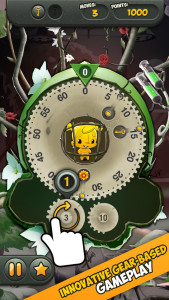Had Wuzzit Trouble been around in 2001, when I was teaching Diophantine equations… well, there wouldn’t have been an iPhone to play it on, and it would probably have been too graphically-intensive for the computers available at the time. However, I’m willing to bet fewer of my students would have fallen asleep in class.
A Diophantine equation is a polynomial equation that wants whole number solutions – the most famous example is the problem in Fermat’s Last Theorem (does $a^n + b^n = c^n$ have any integer solutions for $n>2$? Fermat said no, and gave the greatest ‘my dog ate it’ excuse in the history of maths), scribbled in the margins of Diophantus’s Arithmetica. Typically, given a Diophantine equation, you want to figure out as much as you can about the equations. Are there any? Can you find them? Are there infinitely many? Is there a pattern? It’s the sort of puzzle mathematicians (… some mathematicians, at least) love.
You don’t need a grounding in Diophantine analysis to enjoy Wuzzit Trouble, though, even though it’s all that’s getting me out of my difficulties in the second set of levels. You just need to care about the poor, trapped, cute little Wuzzits enough to try to set them free – which you do by turning a giant cog in given increments so that it lands on a key. For instance, if the key was at number 23 and you could turn the thing in increments of 6 and 7, you might move forward by 6 five times, and backwards by 7 once. Or you might go forward by 7 five times, and backwards by 6 twice.
My one mild criticism is that the cogs have a rather arbitrary 65 teeth (going back 7 from the start takes you to 58 rather than -7). I suppose that’s a back door into modulo arithmetic, if you squint a bit, but I’d much rather have had some negative numbers in there – or, if modulo was a deliberate choice, have picked 60 to tie in with time work.
In later levels, you can pick up bonuses (or penalties) for landing on certain numbers. The fewer moves you need, the more stars you receive – I rather wish it had some square roots in it so I could legitimately make an ‘Angry Surds’ joke. It’s just as addictive, though; I’ve had to put my phone on the other side of the room so I can write this without getting distracted.
The thinking behind it is quite nice, too: its website draws an analogy with music, saying that if you pick up an instrument and mess around with it thoughtfully, you can’t help but learn something about music. Wuzzit Trouble follows the same kind of route with maths: it’s not trying to teach anything about Diophantus or algebra or number theory, but in solving the puzzles, you can’t avoid learning something about them. Many – perhaps most – maths games fall into one of two categories: dull, pedagogic, worksheet-like ‘games’ of the sort I routinely come up with, and maths-by-stealth games that fool nobody. Thankfully, Wuzzit Trouble avoids both categories. One of Innertube Games’s co-founders is Professor Keith Devlin, one of the mathsphere’s greatest game-based-learning advocates; I’d be surprised and disappointed not to see more games in this vein in the relatively near future.
It even feels like real maths (after all, it is real maths). You try things. You get nowhere. You scramble for any sort of solution. You refine it, make it more elegant. You develop strategies, spot patterns. You give up for a while and grab a coffee. You ask your pals, “how did you get on with level 2-16?” when you really mean “I’m stuck on level 2-16, please tell me you can’t do it, either.” I can readily imagine any student old enough to recognise numbers playing with it and getting something out of it – and it’s something parents can readily get involved in, too.
If I was teaching Diophantine equations these days, I’d probably get ten minutes in and realise everyone was busily rescuing Wuzzits on their phones. I would smile, head to the nearest comfy chair, and take a nice early-morning nap. Everyone wins.
Links
Wuzzit Trouble by Innertube Games

According to Tom Davis, an advisor and angel investor, 65 is the product of a nice prime, 5, and an ugly prime, 13.
I have enjoyed working through the Wuzzit problems (games) – it really is for everyone at any level.
While playing I thought about the choice of 65 and came up with two reasons.
It is an odd number and hence turning back past it in increments of an even number starting from an even number lands you on odd numbers.
Also modulo 65 is unfamiliar territory with many multiplications not at the tip of our fingers, and that seems to work well for the math thinking purposes of the more challenging problems.